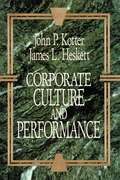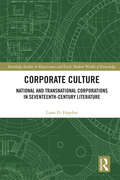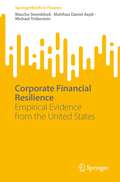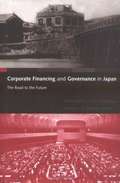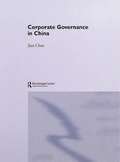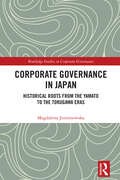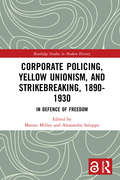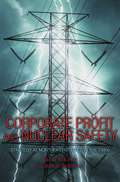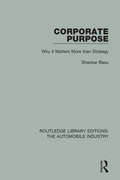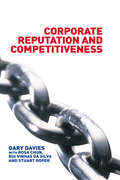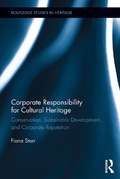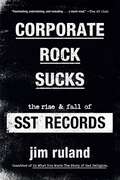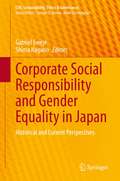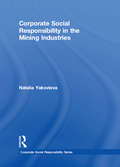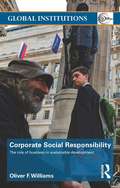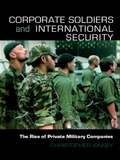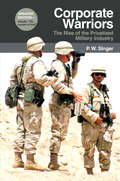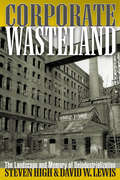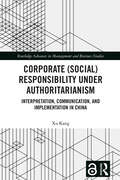- Table View
- List View
Corporate Culture and Performance
by John P. KotterGoing far beyond previous empirical work, John Kotter and James Heskett provide the first comprehensive critical analysis of how the "culture" of a corporation powerfully influences its economic performance, for better or for worse. Through painstaking research at such firms as Hewlett-Packard, Xerox, ICI, Nissan, and First Chicago, as well as a quantitative study of the relationship between culture and performance in more than 200 companies, the authors describe how shared values and unwritten rules can profoundly enhance economic success or, conversely, lead to failure to adapt to changing markets and environments.With penetrating insight, Kotter and Heskett trace the roots of both healthy and unhealthy cultures, demonstrating how easily the latter emerge, especially in firms which have experienced much past success. Challenging the widely held belief that "strong" corporate cultures create excellent business performance, Kotter and Heskett show that while many shared values and institutionalized practices can promote good performances in some instances, those cultures can also be characterized by arrogance, inward focus, and bureaucracy -- features that undermine an organization's ability to adapt to change. They also show that even "contextually or strategically appropriate" cultures -- ones that fit a firm's strategy and business context -- will not promote excellent performance over long periods of time unless they facilitate the adoption of strategies and practices that continuously respond to changing markets and new competitive environments.Fundamental to the process of reversing unhealthy cultures and making them more adaptive, the authors assert, is effective leadership. At the heart of this groundbreaking book, Kotter and Heskett describe how executives in ten corporations established new visions, aligned and motivated their managers to provide leadership to serve their customers, employees, and stockholders, and thus created more externally focused and responsive cultures.
Corporate Culture: National and Transnational Corporations in Seventeenth-Century Literature (Routledge Studies in Renaissance and Early Modern Worlds of Knowledge)
by Liam D. HaydonThe corporation – an immortal collective bound to act for the common good – was developed in the seventeenth century, but comparatively little attention has been paid to its literary ramifications. This work combines corporate history with literary analysis to demonstrate how corporations, and the literature they engendered, shaped ideas of the public sphere, trust, the morality of trade and exchange, national identity, and salvation. Drawing on a wide range of genres – including corporate publications, letters, and minute books; dramatic works; epic poetry and sermons – this study shows how widely corporate rhetoric spread, and how embedded it was in the early modern social imagination.
Corporate Financial Distress: A Study of the Italian Manufacturing Industry (SpringerBriefs in Finance)
by Matteo Pozzoli Francesco PaoloneThis book explores methods and techniques to predict and eventually prevent financial distress in corporations. It analyzes the effects of the global financial crisis on Italian manufacturing companies and, more specifically, whether the crisis has increased the number of firms that are likely to fail. In the first chapter, the authors widely discuss the Corporate Financial Distress as well as the process and costs incurred. The second chapter is based on a review of the most used statistical models, splitting them into accounting-based and market-based models. The following chapter is dedicated to the methodology and the empirical analysis on Italian manufacturing companies from different industries. The last chapter presents practical evidence from Italian manufacturing companies during the recent financial crisis.
Corporate Financial Resilience: Empirical Evidence from the United States (SpringerBriefs in Finance)
by Michael Trübestein Matthias Daniel Aepli Mascha SteenblockThis research presents a rigorous investigation of US companies' financial resilience within the S&P 500 index from the year 2000 onward. The book focuses on the process of a company's bounce back to pre-crisis levels after a disturbance, exploring resilience measured through recovery duration and various financial performance indicators. The study analyzes three significant crises faced by the US during this period - the dotcom crisis, the global financial crisis, and the pandemic crisis. Through applied cox hazard regression and panel regression, the book reveals valuable empirical insights on factors impacting corporate financial resilience, sector-specific crisis effects, and essential considerations when interpreting the results. Investors, corporations, and researchers alike will find this data-driven resource a paramount asset in navigating the complexities of financial markets and fortifying corporate financial resilience for a prosperous future.
Corporate Financing and Governance in Japan: The Road to the Future
by Takeo Hoshi Anil Kashyap Stanley Fischer45th Nikkei Prize for Excellent Books in Economic Science, presented by the Japan Center for Economic Research and Nihon Keizai Shimbun Inc. on November 5, 2002. In this book Takeo Hoshi and Anil Kashyap examine the history of the Japanese financial system, from its nineteenth-century beginnings through the collapse of the 1990s that concluded with sweeping reforms. Combining financial theory with new data and original case studies, they show why the Japanese financial system developed as it did and how its history affects its ongoing evolution. The authors describe four major periods within Japan's financial history and speculate on the fifth, into which Japan is now moving. Throughout, they focus on four questions: How do households hold their savings? How is business financing provided? What range of services do banks provide? And what is the nature and extent of bank involvement in the management of firms? The answers provide a framework for analyzing the history of the past 150 years, as well as implications of the just-completed reforms known as the "Japanese Big Bang. " Hoshi and Kashyap show that the largely successful era of bank dominance in postwar Japan is over, largely because deregulation has exposed the banks to competition from capital markets and foreign competitors. The banks are destined to shrink as households change their savings patterns and their customers continue to migrate to new funding sources. Securities markets are set to re-emerge as central to corporate finance and governance.
Corporate Governance and Sustainability: Challenges for Theory and Practice (Routledge Contemporary Corporate Governance)
by Suzanne Benn Dexter DunphyIn recent years, as corporations and governments have increasingly been confronted with managing the expectations of a society newly alerted to the social and environmental risks of economic development, recognition is dawning that achieving a sustainable world is dependent upon the democratic management and equitable distribution of these risks for now, and for the future. This book, the first to explore the themes of corporate governance and sustainability, argues that a better system of governance on a number of levels holds the key. Contributed to and edited by a distinguished international team, this book recognizes the complex and contested nature of both sustainability and governance, and that these key concepts have been redefined considerably over time. As sustainability poses new and major challenges for the theory and practice of corporate governance, this book, ideal for postgraduate students of business and management, identifies and addresses these challenges.
Corporate Governance in China (Routledge Studies on the Chinese Economy #Vol. 9)
by Jian ChenBased on extensive original economic analysis, Chen examines key questions relating to corporate governance in China, including the relationship between ownership structure and corporate performance, the determinants of capital structure, and the nature of contemporary governance structures. It concludes that corporate performance is positively related to ownership concentration, but negatively related to state ownership, and that contemporary corporate governance structures are heavily dependent on previous structures in the centrally-planned economy and on the path of transition to the market economy.
Corporate Governance in Japan: Historical Roots from the Yamato to the Tokugawa Eras (Routledge Studies in Corporate Governance)
by Magdalena JerzemowskaThe roots of corporate governance are rarely looked for in the ancient history of countries. Literature pays not enough attention to the impact of the country’s history on the relations between economic actors and owners, known today as corporate governance. Many countries are guided by centuries-old traditions and customs, which is especially true of Japan. Japan is of particular interest because history of its corporate governance is not widely known and because it has developed a unique corporate governance model. This book aims to diagnose and trace the causes and symptoms of this uniqueness, emphasizing that it is a lasting legacy of previous eras. It examines key political, social, cultural, and economic events in Japan from its dawn till the 17th century in a comprehensive way and in the cause-and-effect aspect, combining the history, economic history, and the history of corporate governance. It refers to little-known issues considered in the context of a very interesting and successful country and economy, which may arouse the desire to expand knowledge and learn about the roots of these successes. The innovative nature of the research goal and the simplicity of presentation are the advantages of this book.
Corporate Policing, Yellow Unionism, and Strikebreaking, 1890-1930: In Defence of Freedom (Routledge Studies in Modern History)
by Matteo Millan; Alessandro SaluppoThis book provides a comparative and transnational examination of the complex and multifaceted experiences of anti-labour mobilisation, from the bitter social conflicts of the pre-war period, through the epochal tremors of war and revolution, and the violent spasms of the 1920s and 1930s. It retraces the formation of an extensive market for corporate policing, privately contracted security and yellow unionism, as well as processes of professionalisation in strikebreaking activities, labour espionage and surveillance. It reconstructs the diverse spectrum of right-wing patriotic leagues and vigilante corps which, in support or in competition with law enforcement agencies, sought to counter the dual dangers of industrial militancy and revolutionary situations. Although considerable research has been done on the rise of socialist parties and trade unions the repressive policies of their opponents have been generally left unexamined. This book fills this gap by reconstructing the methods and strategies used by state authorities and employers to counter outbreaks of labour militancy on a global scale. It adopts a long-term chronology that sheds light on the shocks and strains that marked industrial societies during their turbulent transition into mass politics from the bitter social conflicts of the pre-war period, through the epochal tremors of war and revolution, and the violent spasms of the 1920s and 1930s. Offering a new angle of vision to examine the violent transition to mass politics in industrial societies, this is of great interest to scholars of policing, unionism and striking in the modern era.
Corporate Profit and Nuclear Safety: Strategy at Northeast Utilities in the 1990s
by Paul W. MacAvoy Jean W. RosenthalNortheast Utilities Company adopted an ambitious new competitive strategy in the mid-1980s, seeking to become the low-cost supplier in New England electric power markets bracing for deregulation. Given its high-cost nuclear facilities, doing so required a corporate turnaround. For a decade Northeast faced increasing public and employee resistance to cost cutting at its nuclear plants. Though management achieved many of its goals, curtailing outlays on nuclear operations meant high risk that the Nuclear Regulatory Commission would close the plants because of frequent, prolonged outages. This is just what happened in 1996. Did management's deliberate cost-containment strategy take nuclear operations to an inevitable regulatory shutdown, and if so, why? Was it the pursuit of executive compensation tied to cost containment that caused undue risk of regulatory shutdown? Paul MacAvoy and Jean Rosenthal describe ten years of corporate performance preceding the shutdown, detailing aggressive executive decisions, mounting regulatory actions in response to increasingly severe operational failures, and--at the same time--overall improvement in corporate earnings, stock prices, and executive pay packages. They relate the complexities of managing declining nuclear plant operations under ever more pressing budgetary targets. Their discussion of the increasing risk of outages raises the issue of the tradeoff of profit and conservative management of hazard operations. All the more timely in light of the massive 2003 East Coast blackout, Corporate Profit and Nuclear Safety represents a powerful and cautionary commentary on industrial practices that goes to the heart of effective corporate governance.
Corporate Purpose: Why It Matters More Than Strategy (Routledge Library Editions: The Automobile Industry)
by Shankar BasuOriginally published in 1999 after a decade of research and extensive interviews with some of Toyota's top executives, this book examines organizational purpose: what it is, how it is crafted, how does it relate to strategy and objectives and how does it relate to decisions and actions that ultimately produce organizational results. The author explains why Toyoto Motor Corporation was selected to study corporate purpose and examines the various factors that influence purpose. An overview is given of Toyota in the 1990s and its operating environment, particularly outlining the importance of the Japanes motor industry to Japanese society. Operational objectives of Toyota are analyzed and research findings, data and analysis related to Toyota's purpose are presented and the implications described. In the appendix, the detail of the research methodology of this study is included.
Corporate Reputation and Competitiveness
by Stuart Roper Rosa Chun Rui Da Silva Gary DaviesThis unique book written by four world leaders in reputation research, presents the latest cutting-edge thinking on organizational improvement. It covers media management, crisis management, the use of logos and other aspects of corporate identity, and argues the case for reputation management as a way of overseeing long-term organizational strategy. It presents a new approach to managing reputation, one that relies on surveying customers and employees on their view of the corporate character and in harmonizing the values of both. This approach has been trialled in a number of organizations and here the authors demonstrate how improving reputation, merely by learning more about what a company is already doing, is worth some five per cent sales growth. The book is a vital, up to date resource for specialists in corporate communication, public relations, marketing, HRM, and business strategy as well as for all senior management. Highly illustrated with over eighty diagrams and tables, it includes up to the minute illustrative case studies and interviews with leading authorities in the field.
Corporate Research Laboratories and the History of Innovation (Routledge Studies in Management, Organizations and Society)
by David M. PithanWith the beginning of the twentieth century, American corporations in the chemical and electrical industries began establishing industrial research laboratories. Some went on to become world-famous not only for their scientific and technological breakthroughs but also for the new union of science and industry they represented. Innovative ideas do not simply appear out of the blue and spread on their own merit. Rather, the laboratory's diffusion takes place in a cultural context that goes beyond corporate capital and technological change. Using discourse analysis as a method to comprehensively capture the organizational field of the early American R&D laboratories from 1870 to 1930, this book uncovers the collective meanings associated with the industrial laboratory. Meanings such as what and where a laboratory is supposed to be, who the scientist is, and what it means to practice science provided cultural resources that made the transfer of the laboratory from academic science into an industrial setting possible by rendering such meanings understandable and operable to big business and organizational entrepreneurs fighting for hegemony in a rapidly evolving market. It analyzes not only the corporations that established laboratories in the United States but also their contexts – economic, political, and especially scientific – showing how "the industrial laboratory" was transformed from an organizational novelty into an expected institution in less than two decades. This book will be of interest to researchers, academics, historians, and students in the fields of organizational change, discourse studies, the management of technology and innovation, as well as business and management history.
Corporate Responsibility for Cultural Heritage: Conservation, Sustainable Development, and Corporate Reputation
by Fiona StarrThis book examines the relationship between two divergent fields – corporate activity and heritage conservation – linking the financing of conservation and its benefits with the corporate social responsibility (CSR) goals of the private sector. Through discussion of physical conservation, benefits to heritage site visitors, sustainable development impacts, and corporate benefits such as improved reputation, this book outlines the shared value of corporate support for cultural heritage sites, and encourages financial and in-kind support for conservation and responsible activity by the private sector. Providing a convincing commercial rationale for CSR managers to engage with cultural heritage sites, this book suggests how companies may reap the benefits of CSR for heritage. Author Fiona Starr offers advice for companies looking to specialize in a unique CSR endeavor, especially those looking to engage with emerging markets. The book also provides useful strategies for heritage managers to attract CSR and financial support, offering new look at the financing of heritage conservation at both international and local levels and providing a new approach to the future of financing of cultural heritage conservation
Corporate Rock Sucks: The Rise and Fall of SST Records
by Jim RulandA no-holds-barred narrative history of the iconic label that brought the world Black Flag, Hüsker Dü, Sonic Youth, Soundgarden, and more, by the co-author of Do What You Want and My Damage.Greg Ginn started SST Records in the sleepy beach town of Hermosa Beach, CA, to supply ham radio enthusiasts with tuners and transmitters. But when Ginn wanted to launch his band, Black Flag, no one was willing to take them on. Determined to bring his music to the masses, Ginn turned SST into a record label. On the back of Black Flag&’s relentless touring, guerilla marketing, and refusal to back down, SST became the sound of the underground.In Corporate Rock Sucks, music journalist Jim Ruland relays the unvarnished story of SST Records, from its remarkable rise in notoriety to its infamous downfall. With records by Black Flag, Minutemen, Hüsker Dü, Bad Brains, Sonic Youth, Dinosaur Jr, Screaming Trees, Soundgarden, and scores of obscure yet influential bands, SST was the most popular indie label by the mid-80s--until a tsunami of legal jeopardy, financial peril, and dysfunctional management brought the empire tumbling down. Throughout this investigative deep-dive, Ruland leads readers through SST&’s tumultuous history and epic catalog.Featuring never-before-seen interviews with the label's former employees, as well as musicians, managers, producers, photographers, video directors, and label heads, Corporate Rock Sucks presents a definitive narrative history of the &’80s punk and alternative rock scenes, and shows how the music industry was changed forever.
Corporate Romanticism: Liberalism, Justice, and the Novel (Lit Z)
by Daniel M. StoutCorporate Romanticism offers an alternative history of the connections between modernity, individualism, and the novel. In early nineteenth-century England, two developments—the rise of corporate persons and the expanded scale of industrial action—undermined the basic assumption underpinning both liberalism and the law: that individual human persons can be meaningfully correlated with specific actions and particular effects. Reading works by Godwin, Austen, Hogg, Mary Shelley, and Dickens alongside a wide-ranging set of debates in nineteenth-century law and Romantic politics and aesthetics, Daniel Stout argues that the novel, a literary form long understood as a reflection of individualism’s ideological ascent, in fact registered the fragile fictionality of accountable individuals in a period defined by corporate actors and expansively entangled fields of action.Examining how liberalism, the law, and the novel all wrestled with the moral implications of a highly collectivized and densely packed modernity, Corporate Romanticism reconfigures our sense of the nineteenth century and its novels, arguing that we see in them not simply the apotheosis of laissez-fair individualism but the first chapter of a crucial and distinctly modern problem about how to fit the individualist and humanist terms of justice onto a world in which the most consequential agents are no longer persons.
Corporate Security Intelligence and Strategic Decision Making
by Justin CrumpDespite a clear and compelling need for an intelligence-led approach to security, operational, and reputational risks, the subject of corporate security intelligence remains poorly understood. An effective intelligence process can directly support and positively impact operational activity and associated decision-making and can even be used to driv
Corporate Social Responsibility and Gender Equality in Japan: Historical and Current Perspectives (CSR, Sustainability, Ethics & Governance)
by Gabriel Eweje Shima NaganoThis book examines key issues in gender equality and corporate social responsibility in Japan. Legal compliance, the business case and social regulation are examined as driving factors for enhancing gender equality in corporations. In turn, case studies from various contexts, such as the hotel industry, retail and financial services companies add practical insights to the theoretical debate. The role of governments, NGOs and supranational organizations is examined as well. Given its scope, the book will appeal to undergraduate and graduate students, scholars, policymakers and practitioners interested in advancing the gender, CSR and sustainability debates.
Corporate Social Responsibility in the Mining Industries (Corporate Social Responsibility Series)
by Natalia YakovlevaBased on the concept of corporate social responsibility, this book analyses modern approaches adopted by mining companies that could minimise negative impacts of mining and enhance positive benefits to corporate stakeholders. Using a case study of two mining sectors (gold and diamond mining) the book evaluates policies and practices of mining companies within four key areas of corporate social responsibility: environmental protection, health and safety, employee relations and community development. Also included is an assessment of three models for community development that are developed within the mining industries: company-led approach, establishment of corporate foundation and tri-sector partnership. The study analyses management of corporate social responsibility issues with specific reference to mining in the Russian Federation and provides a comparison with global mining companies.
Corporate Social Responsibility: The Role of Business in Sustainable Development (Global Institutions)
by Oliver F. WilliamsOver the last 30 years, corporate social responsibility (CSR) has become a household term, reflecting a combination of factors that we have come to associate with that most catch-all of terms "globalization," including the widespread popular concern with such social issues as the environment and international human rights. Corporate Social Responsibility examines the history of the idea of business ethics (which goes back at least to ancient Mesopotamia) before exploring the state of CSR today. This book argues that a wide-ranging understanding of the purpose of business is necessary to create value for a community of stakeholders which in turn can generate a sustainable future. The book suggests that corporations still have a long way to go, but remains optimistic. The book’s sanguine interpretation of the current state of corporate affairs and a recommended way forward, results not only from the authors analysis, but also his direct experience. This book presents the case that we are in the midst of a major paradigm shift in our understanding of the purpose of business and that this new understanding holds much promise for business being a significant force for a more just and peaceful world. This work provides a concise overview of CSR and an important examination of the present and future work of the UN Global Compact and will be of interest to students of international organizations, international business and corporate social responsibility.
Corporate Soldiers and International Security: The Rise of Private Military Companies (Contemporary Security Studies)
by Christopher KinseyThis book traces the history of private military companies, with a special focus on UK private forces. Christopher Kinsey examines the mercenary companies that filled the ranks of many European armies right up to the 1850s, the organizations that operated in Africa in the 1960s and early 1970s, the rise of legally established private military companies in the late 1970s and early 1980s, and today’s private and important actors in international security and post-conflict reconstruction. He shows how and why the change from the mercenary organizations of the 1960s and 1970s came about, as the increasing newness of private military companies came to be recognised. It then examines how PMCs have been able to impact upon international security. Finally, Kinsey looks at the type of problems and advantages that can arise for organizations that decide to use private military companies and how they can make an unique contribution to international security. Corporate Soldiers and International Security will be of great interest to all students of international politics, security studies and war studies.
Corporate Warriors
by P. W. SingerSome have claimed that ?War is too important to be left to the generals,? but P. W. Singer asks ?What about the business executives? Breaking out of the guns-for-hire mold of traditional mercenaries, corporations now sell skills and services that until recently only state militaries possessed. Their products range from trained commando teams to strategic advice from generals. This new ?Privatized Military Industry? encompasses hundreds of companies, thousands of employees, and billions of dollars in revenue. Whether as proxies or suppliers, such firms have participated in wars in Africa, Asia, the Balkans, and Latin America. More recently, they have become a key element in U. S. military operations. Private corporations working for profit now sway the course of national and international conflict, but the consequences have been little explored. In this book, Singer provides the first account of the military services industry and its broader implications. Corporate Warriors includes a description of how the business works, as well as portraits of each of the basic types of companies: military providers that offer troops for tactical operations; military consultants that supply expert advice and training; and military support companies that sell logistics, intelligence, and engineering. The privatization of warfare allows startling new capabilities and efficiencies in the ways that war is carried out. At the same time, however, Singer finds that the entrance of the profit motive onto the battlefield raises a series of troubling questions'for democracy, for ethics, for management, for human rights, and for national security.
Corporate Wasteland: The Landscape and Memory of Deindustrialization
by David Lewis Steven HighDeindustrialization is not simply an economic process; it is also a social and cultural phenomenon. The rusting detritus of our industrial past-the wrecked halls of factories, abandoned machinery too large to remove, and now-useless infrastructures-has for decades been a part of the North American landscape. Through a unique blend of oral history, photographs, and interpretive essays, Corporate Wasteland investigates this fascinating terrain and the phenomenon of its loss and rediscovery.
Corporate: Interpretation, Communication, and Implementation in China (Routledge Advances in Management and Business Studies)
by Xu KangThis book provides an in-depth exploration of corporate social responsibility (CSR) in the authoritarian context. It challenges prevailing CSR frameworks, which largely derive from liberal democratic contexts and overlook how political institutions shape the conceptualisation and practice of corporate responsibility. By situating CSR within China’s political-economic system, the book sheds light on how CSR is dynamically interpreted, strategically communicated, and selectively implemented by corporate and state actors.Drawing on a mixed-method research design, the study analyses both qualitative and quantitative evidence. The analysis integrates policy documents, regulatory frameworks, CSR and sustainability reports from Chinese corporations, and in-depth qualitative interviews with corporate managers, NGO leaders, and experts. The findings highlight how CSR in China emerges through the normative interplay between market logics and power politics, involving various actors, including enterprises, state entities, and NGOs. The book also presents a critical account of how Chinese companies strategically adapt CSR discourses to align with governmental priorities while navigating complex stakeholder relationships.A book of vital interest to researchers in business ethics, international business and Asian studies, it will also appeal to practitioners and policymakers seeking to enhance strategies and policies for responsible business conduct.
Corporation Nation
by Robert E. WrightFrom bank bailouts and corporate scandals to the financial panic of 2008 and its lingering effects, corporate governance in America has been wracked with crises. Amid a weakening system of checks and balances in which corporate executives have little incentive to protect shareholder interests, U.S. corporations are growing larger and more irresponsible at the same time. But dependence on corporate profit was crucial to the early republic's growth, success, and security: despite protests that incorporated business was an inefficient and potentially corrupting system, U.S. state governments chartered more corporations per capita than any other nation--including Britain--effectively making the United States a "corporation nation." Drawing on legal and economic history, Robert E. Wright traces the development and decline of corporate institutions in America, connecting today's financial failures to deteriorating corporate law.In the nineteenth century, checks and balances kept managerial interests aligned with those of stockholders, and public opinion grew supportive as corporations raised billions of dollars to finance infrastructure such as transportation networks, financial systems, and manufacturing operations. But many of these checks and balances were dismantled after the Civil War, allowing leeway for the managerial malfeasance that spiraled into economic crisis in the twenty-first century. Bolstered with archival and original data, including the first complete count of American business corporations before the Civil War, Corporation Nation makes a compelling argument for improved internal governance and more effective external government regulation.
